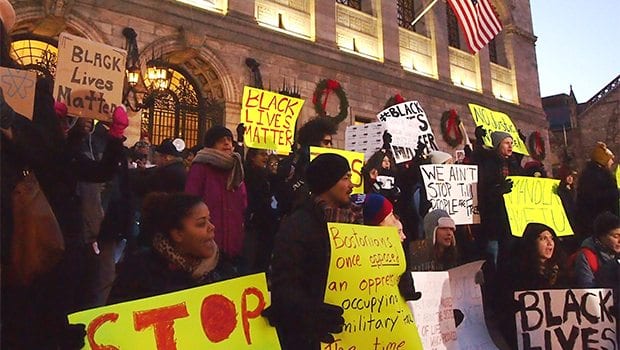
Roxbury resident Armani White estimates he’s been stopped dozens of times by police, as often as twice a week during his teen-age years.
“A squad car rolls up on you,” said White, a senior at Wesleyan University in Connecticut. “They ask you where you’re going and why. They ask your name. They ask for ID.”
Like many black teens in Boston, if not most, White has been searched, cursed out, posted against walls and otherwise detained by police. While he’s never been taken into custody, he views the stops as a violation of his rights.
As common as White’s experience is, neither he nor any other black teenager in Boston can substantiate their claims of multiple police stops. Although police are required to record stops in their Field Intelligence Observation database, they are not required to share information on pedestrian or motor vehicle stops with the public.
That could soon change, as members of the Massachusetts Legislative Black and Latino Caucus are considering filing legislation that would require police to make data on stops public and issue receipts to pedestrians stopped.
ACLU Massachusetts attorney Carlton Williams says requiring police to issue receipts would add a measure of accountability to police work.
“If an individual wants to complain about it, they can document it,” he commented. “They can say, ‘I got stopped 27 times – every time I leave my house,’ and they can document it.”
“It would give people whose rights are being abused a chance at some kind of justice,” White said. “People whose rights are being abused on a regular basis would have a chance to find out why it’s happening.”
In addition to documentation, police officers would be forced to disclose their identity to people they stop. While police are required to give their name and badge number when asked, in practice it rarely happens, Williams said.
“If you say, ‘what’s your badge number?’ that’s like saying ‘I have a problem with you,’” he said. “That can start a fight.”
The idea of police issuing receipts is not new. Police in London are required to issue receipts upon request if they question or search pedestrians.
The push for receipts in Massachusetts comes as police practices are coming under increased scrutiny in Boston and across the nation. The high profile police killings of unarmed black men, including Staten Island resident Eric Garner and Ferguson, Missouri teen Michael Brown, have sparked a national protest movement.
In Boston, a study released by the ACLU of Massachusetts found that blacks are subjected to a disproportionate share of police stops for questioning, pat-downs and searches. While police officials have argued that the stops are occurring in high-crime areas, many teens say they are stopped repeatedly, despite having no criminal involvement.
“People are getting stopped for absolutely no reason,” White said. “If they searched people in the Back Bay the way they do in Dorchester, they would probably find more drugs.”
Caucus members say they will file legislation on police stops by the Jan. 16 filing deadline. Among the measures being considered are a provision to require all police departments — including State Police and Transit Police — to collect and make public race data for all pedestrian and motor vehicular stops, and a provision to appoint an outside investigator to probe police shootings.
State Sen. Linda Dorcena Forry says requiring police to report data will ultimately help police do their job better.
“This legislation will help police and help our community to determine how we can do better,” she said. “The community has to be a part of it. We have work to do.”


![Banner [Virtual] Art Gallery](https://baystatebanner.com/wp-content/uploads/2024/04/Cagen-Luse_Men-at-store-e1713991226112-150x150.jpg)



